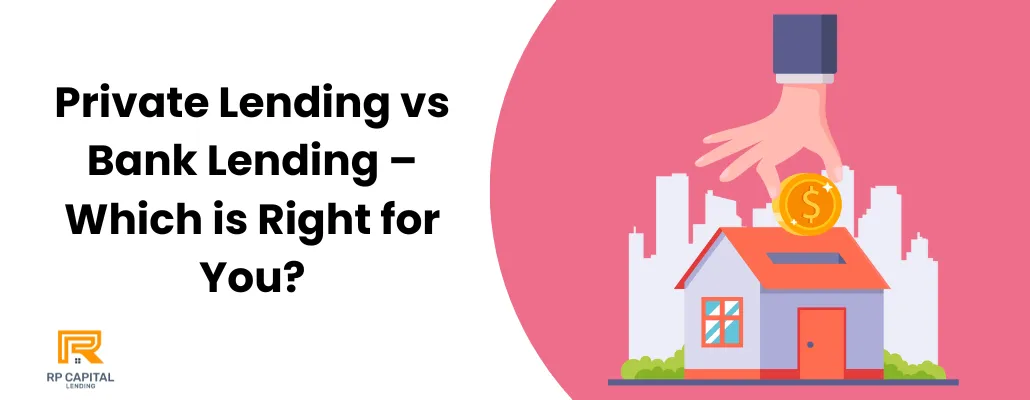Blog

Private Lending vs Bank Lending – Which is Right for You?
When it comes to financing, individuals and businesses often find themselves choosing between private lending and bank lending. Both options have their unique features, benefits, and drawbacks. Understanding the differences between these two lending types is crucial for making an informed financial decision.
What is Private Lending?
Private lending involves loans provided by individuals or non-bank institutions. This type of lending is characterized by its flexibility and personalized approach. Private lenders often have less stringent eligibility criteria, focusing more on the value of collateral and the borrower's ability to repay rather than their credit history.
The interest rates can be higher, reflecting the potentially higher risk involved. Private loans are typically sought for their quick approval processes, making them ideal for urgent financial needs or for borrowers who may not qualify for traditional bank loans. However, they often come with higher risks and less regulatory protection.
What is Bank Lending?
Bank lending refers to loans provided by licensed banking institutions. These loans are known for their structured and standardized approach, adhering to strict regulatory guidelines. Eligibility for bank loans usually requires a strong credit history and a stable financial background. Banks typically offer lower interest rates compared to private lenders, making them a more affordable option over the long term.
The application process for bank loans is more comprehensive, involving detailed credit checks and financial analysis. While the approval process can be slower, bank loans are favored for their safety, regulatory protection, and suitability for larger, long-term financial needs.
Eligibility Criteria
For private lending, the eligibility criteria can be less stringent, focusing more on the value of the collateral and the borrower's ability to repay. Bank lending, however, often requires a strong credit history and a stable financial background.
Interest Rates and Terms
Interest rates in private lending can be higher, reflecting the higher risk. The terms of these loans are also more variable. Bank loans usually offer lower interest rates but with more rigid repayment schedules.
Application Process
The application process for private loans is generally quicker and less bureaucratic than for bank loans, which involve a detailed credit check and financial analysis.
Speed of Funding
Private loans can often be secured faster than bank loans, which is a significant advantage in time-sensitive situations.
Loan Amounts
Private lenders typically offer smaller loan amounts than banks, which can provide larger loans based on the borrower's financial standing.
Credit Requirements
Private lending is more accessible for those with less-than-perfect credit, while bank lending usually requires a good to excellent credit score.
Flexibility and Customization
Private lending stands out for its adaptability, offering tailored loan terms and repayment options to suit individual needs. This contrasts with bank lending, where loans are more standardized and less flexible, adhering to strict policies and regulations.
Risks and Benefits
Private lending carries higher risks due to its less regulated nature but offers quick, personalized funding solutions. Bank lending, while slower and more rigid, provides a safer and more structured financial environment, often with consumer protections in place.
Regulations and Compliance
Private loans are subject to fewer regulations, providing more freedom in their lending practices, but less consumer protection. In contrast, bank loans are heavily regulated, ensuring fairness and safety in financial dealings and protecting both the lender and borrower.
Use Cases
Private lending is often used for real estate investments, short-term financing needs, or by individuals who might not qualify for bank loans. Bank lending is preferred for long-term financing and major purchases like homes or cars.
Choosing the Right Option
Selecting between private and bank lending involves evaluating personal financial circumstances, the urgency of funding needs, and risk tolerance.
While private lending offers speed and flexibility, it comes with higher risks. Bank lending, though more secure and regulated, requires a more robust financial profile and patience for the lending process. The decision should align with the borrower's specific financial goals and situation.
Conclusion
In conclusion, the choice between private and bank lending hinges on individual needs and circumstances. Private lending offers speed, flexibility, and accessibility, especially for those with unique financial situations or urgent funding needs. However, it comes with higher risks and less regulation.
Bank lending, on the other hand, provides a more secure and structured financial route, with lower interest rates and stringent regulatory protections, ideal for long-term financing. Careful consideration of these factors is essential to make an informed and suitable financial decision.
FAQs
1. What is the main difference between private and bank lending?
Private lending is more flexible and quicker but often has higher rates and risks, whereas bank lending is more regulated with lower rates and structured terms.
2. Can I get a private loan with bad credit?
Yes, private loans are accessible even with bad credit due to flexible credit requirements.
3. Are bank loans safer than private loans?
Bank loans are generally safer due to stricter regulations.
4. How quickly can I get a private loan compared to a bank loan?
Private loans can be secured faster, often within days, compared to the longer process for bank loans.
5. What factors should I consider when choosing between private and bank lending?
Consider loan terms, urgency, interest rates, credit situation, and loan purpose when choosing between private and bank lending.
RP Capital Lending is a d.b.a of RP Capital Partners Inc (NMLS # 2469193) | Privacy Policy
Copyright © 2022. All Rights Reserved.
Disclaimer: Loans only apply to non-owner occupied properties. Rates, terms and conditions offered only to qualified borrowers, may vary upon loan product, deal structure, other applicable considerations, and are subject to change at any time without notice.

